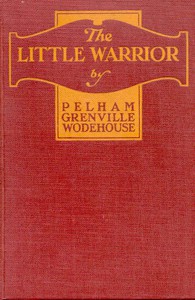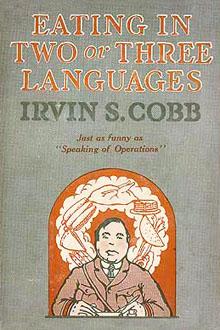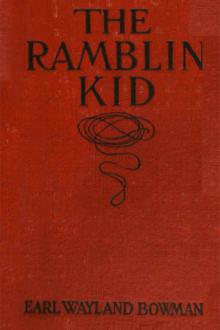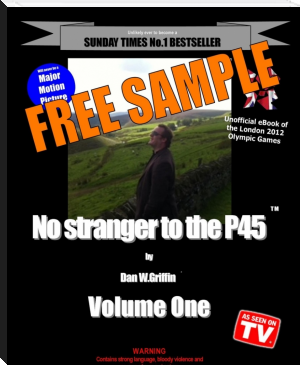The Little Warrior, P. G. Wodehouse [robert munsch read aloud txt] 📗

- Author: P. G. Wodehouse
Book online «The Little Warrior, P. G. Wodehouse [robert munsch read aloud txt] 📗». Author P. G. Wodehouse
“It is!” said Uncle Chris. “I shall be returning there very shortly.” He paused meditatively. “Very shortly indeed.”
Nelly bit her lip. It seemed to be her fate today to meet people who were going to America.
“When did you decide to do that?” asked Jill.
She had been looking at him, puzzled. Years of association with Uncle Chris had enabled her to read his moods quickly, and she was sure that there was something on his mind. It was not likely that the others had noticed it, for his manner was as genial and urbane as ever. But something about him, a look in his eyes that came and went, an occasional quick twitching of his mouth, told her that all was not well. She was a little troubled, but not greatly. Uncle Chris was not the sort of man to whom grave tragedies happened. It was probably some mere trifle which she could smooth out for him in five minutes, once they were alone together. She reached out and patted his sleeve affectionately. She was fonder of Uncle Chris than of anyone in the world except Derek.
“The thought,” said Uncle Chris, “came to me this morning, as I read my morning paper while breakfasting. It has grown and developed during the day. At this moment you might almost call it an obsession. I am very fond of America. I spent several happy years there. On that occasion, I set sail for the land of promise, I admit, somewhat reluctantly. Of my own free will I might never have made the expedition. But the general sentiment seemed so strongly in favor of my doing so that I yielded to what I might call a public demand. The willing hands for my nearest and dearest were behind me, pushing, and I did not resist them. I have never regretted it. America is a part of every young man’s education. You ought to go there, Freddie.”
“Rummily enough,” said Freddie, “I was saying just before you came in that I had half a mind to pop over. Only it’s rather a bally fag, starting. Getting your luggage packed and all that sort of thing.”
Nelly, whose luggage consisted of one small trunk, heaved a silent sigh. Mingling with the idle rich carried its penalties.
“America,” said Uncle Chris, “taught me poker, for which I can never be sufficiently grateful. Also an exotic pastime styled Craps,—or, alternatively, ‘rolling the bones’—which in those days was a very present help in time of trouble. At Craps, I fear, my hand in late years had lost much of its cunning. I have had little opportunity of practising. But as a young man I was no mean exponent of the art. Let me see,” said Uncle Chris meditatively. “What was the precise ritual? Ah! I have it, ‘Come, little seven!’”
“‘Come, eleven!’” exclaimed Nelly excitedly.
“‘Baby …’ I feel convinced that in some manner the word baby entered into it.”
“‘Baby needs new shoes!’”
“‘Baby needs new shoes!’ Precisely!”
“It sounds to me,” said Freddie, “dashed silly.”
“Oh, no!” cried Nelly reproachfully.
“Well, what I mean to say is, there’s no sense in it, don’t you know.”
“It is a noble pursuit,” said Uncle Chris firmly. “Worthy of the great nation that has produced it. No doubt, when I return to America, I shall have opportunities of recovering my lost skill.”
“You aren’t returning to America,” said Jill. “You’re going to stay safe at home like a good little uncle. I’m not going to have you running wild all over the world at your age.”
“Age?” declaimed Uncle Chris. “What is my age? At the present moment I feel in the neighborhood of twenty-one, and Ambition is tapping me on the shoulder and whispering ‘Young man, go West!’ The years are slipping away from me, my dear Jill,—slipping so quickly that in a few minutes you will be wondering why my nurse does not come to fetch me. The wanderlust is upon me. I gaze around me at all this prosperity in which I am lapped,” said Uncle Chris, eyeing the arm-chair severely, “all this comfort and luxury which swaddles me, and I feel staggered. I want activity. I want to be braced!”
“You would hate it,” said Jill composedly. “You know you’re the laziest old darling in the world.”
“Exactly what I am endeavoring to point out. I am lazy. Or, I was till this morning.”
“Something very extraordinary must have happened this morning. I can see that.”
“I wallowed in gross comfort. I was what Shakespeare calls a ‘fat and greasy citizen’!”
“Please, Uncle Chris!” protested Jill. “Not while I’m eating buttered toast!”
“But now I am myself again.”
“That’s splendid.”
“I have heard the beat of the off-shore wind,” chanted Uncle Chris, “and the thresh of the deep-sea rain. I have heard the song—How long! how long! Pull out on the trail again!”
“He can also recite ‘Gunga Din,’” said Jill to Nelly. “I really must apologize for all this. He’s usually as good as gold.”
“I believe I know how he feels,” said Nelly softly.
“Of course you do. You and I, Miss Bryant, are of the gipsies of the world. We are not vegetables like young Rooke here.”
“Eh, what?” said the vegetable, waking from a reverie. He had been watching Nelly’s face. Its wistfulness attracted him.
“We are only happy,” proceeded Uncle Chris, “when we are wandering.”
“You should see Uncle Chris wander to his club in the morning,” said Jill. “He trudges off in a taxi, singing wild gipsy songs, absolutely defying fatigue.”
“That,” said Uncle Chris, “is a perfectly justified slur. I shudder at the depths to which prosperity has caused me to sink.” He expanded his chest. “I shall be a different man in America. America would make a different man of you, Freddie.”
“I’m all right, thanks!” said that easily satisfied young man.
Uncle Chris turned to Nelly, pointing dramatically.
“Young woman, go West! Return to your bracing home, and leave this enervating London! You …”
Nelly got up abruptly. She could endure no more.
“I believe I’ll have to be going now,” she said. “Bill misses me if I’m away long. Good-bye. Thank you ever so much for what you did.”
“It was awfully kind of you to come round,” said Jill.
“Good-bye, Major Selby.”
“Good-bye.”
“Good-bye, Mr Rooke.”
Freddie awoke from another reverie.
“Eh? Oh, I say, half a jiffy. I think I may as well be toddling along myself. About time I was getting back to dress for dinner and all that. See you home, may I, and then I’ll get a taxi at Victoria. Toodle-oo, everybody.”
Freddie escorted Nelly through the hall and opened the front door for her. The night was cool and cloudy, and there was still in the air that odd, rejuvenating suggestion of Spring. A wet fragrance came from the dripping trees.
“Topping evening!” said Freddie conversationally.
“Yes.”
They walked through the square in silence. Freddie shot an appreciative glance at his companion. Freddie, as he would have admitted frankly, was not much of a lad for the modern girl. The modern girl, he considered, was too dashed rowdy and exuberant for a chappie of peaceful tastes. Now, this girl, on the other hand, had all the earmarks of being something of a topper. She had a soft voice. Rummy accent and all that, but nevertheless a soft and pleasing voice. She was mild and unaggressive, and these were qualities which Freddie esteemed. Freddie, though this was a thing he would not have admitted, was afraid of girls, the sort of girls he had to take down to dinner and dance with and so forth. They were too dashed clever, and always seemed to be waiting for a chance to score off a fellow. This one was not like that. Not a bit. She was gentle and quiet and what not.
It was at this point that it came home to him how remarkably quiet she was. She had not said a word for the last five minutes. He was just about to break the silence, when, as they passed under a street lamp, he perceived that she was crying,—crying very softly to herself, like a child in the dark.
“Good God!” said Freddie, appalled. There were two things in life with which he felt totally unable to cope,—crying girls and dog-fights. The glimpse he had caught of Nelly’s face froze him into a speechlessness which lasted until they reached Daubeny Street and stopped at her door.
“Good-bye,” said Nelly.
“Good-bye-ee!” said Freddie mechanically. “That’s to say, I mean to say, half a second!” he added quickly. He faced her nervously, with one hand on the grimy railings. This wanted looking into. When it came to girls trickling to and fro in the public streets, weeping, well, it was pretty rotten and something had to be done about it. “What’s up?” he demanded.
“It’s nothing. Good-bye.”
“But, my dear old soul,” said Freddie, clutching the railing for moral support, “it is something. It must be! You might not think it, to look at me, but I’m really rather a dashed shrewd chap, and I can see there’s something up. Why not give me the jolly old scenario and see if we can’t do something?”
Nelly moved as if to turn to the door, then stopped. She was thoroughly ashamed of herself.
“I’m a fool!”
“No, no!”
“Yes, I am. I don’t often act this way, but, oh, gee! hearing you all talking like that about going to America, just as if it was the easiest thing in the world, only you couldn’t be bothered to do it, kind of got me going. And to think I could be there right now if I wasn’t a bonehead!”
“A bonehead?”
“A simp. I’m all right as far up as the string of near-pearls, but above that I’m reinforced concrete.”
Freddie groped for her meaning.
“Do you mean you’ve made a bloomer of some kind?”
“I pulled the worst kind of bone. I stopped on in London when the rest of the company went back home, and now I’ve got to stick.”
“Rush of jolly old professional engagement, what?”
Nelly laughed bitterly.
“You’re a bad guesser. No, they haven’t started to fight over me yet. I’m at liberty, as they say in the Era.”
“But, my dear old thing,” said Freddie earnestly, “if you’ve got nothing to keep you in England, why not pop back to America? I mean to say, home-sickness is the most dashed blighted thing in the world. There’s nothing gives one the pip to such an extent. Why, dash it, I remember staying with an old aunt of mine up in Scotland the year before last and not being able to get away for three weeks or so, and I raved—absolutely gibbered—for a sight of the merry old metrop. Sometimes I’d wake up in the night, thinking I was back at the Albany, and, by Jove, when I found I wasn’t I howled like a dog! You take my tip, old soul, and pop back on the next boat.”
“Which line?”
“How do you mean, which line? Oh, I see, you mean which line? Well … well … I’ve never been on any of them, so it’s rather hard to say. But I hear the Cunard well spoken of, and then again some chappies swear by the White Star. But I should imagine you can’t go far wrong, whichever you pick. They’re all pretty ripe, I fancy.”
“Which of them is giving free trips? That’s the point.”
“Eh? Oh!” Her meaning dawned upon Freddie. He regarded her with deep consternation. Life had treated him so kindly that he had almost forgotten that there existed a class which had not as much money as himself. Sympathy welled up beneath his perfectly fitting waistcoat. It was a purely disinterested sympathy. The fact that Nelly was a girl and in many respects a dashed pretty girl did not affect him. What mattered was that she was hard up. The thought hurt Freddie like a blow. He hated the idea of anyone being hard up.
“I say!” he said. “Are you broke?”
Nelly laughed.
“Am I! If dollars were doughnuts, I wouldn’t even have the hole in the middle.”
Freddie was stirred to his depths. Except for the beggars in the streets, to whom he gave shillings, he had not met anyone for years who had not plenty of money. He had friends at his clubs who frequently claimed to be unable to lay their hands on a bally penny, but the bally penny they wanted to lay their hands on generally turned out to be a couple of thousand pounds for a new car.
“Good God!” he said.
There was a pause. Then, with a sudden impulse, he began to fumble in his breast-pocket. Rummy how things worked out for the best, however scaly they might seem at the moment. Only an hour or so ago he had been kicking himself for not having remembered that fifty-pound note, tacked onto the lining of his coat, when it would have come in handy at the





Comments (0)